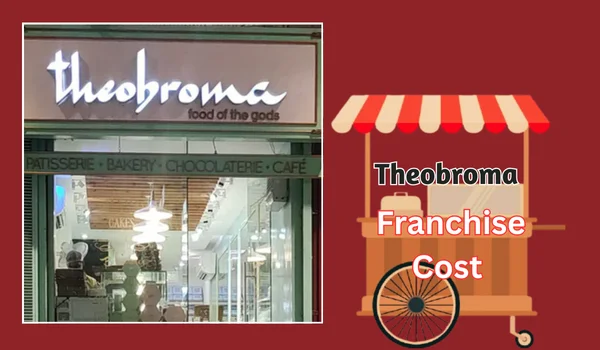If you’re considering a premium patisserie franchise in India, Theobroma is one of the first names that comes to mind — famous for its brownies, cakes, patisserie, savouries and café-style experience. This advisor-style guide covers the realistic investment model, ROI expectations, who qualifies, and a step-by-step application path so you can decide whether a Theobroma franchise fits your plans.
Short context: Theobroma is a rapidly-scaling pan-India patisserie chain (200+ outlets claimed on its site) and has been the subject of active PE/strategic investor interest — a sign of aggressive growth and deeper franchising/expansion playbooks.
Is Theobroma franchising publicly offered — and what formats are available?

Theobroma operates patisseries and café-style stores and accepts franchise enquiries via its official channels. Public franchise listings and industry portals show that Theobroma is offered in standalone patisserie / café formats and sometimes as mall kiosks or smaller outlets depending on city and catchment. Exact formats, BOQ (bill of quantities) and commercial terms are shared to prospective partners after initial enquiry. Always treat third-party numbers as indicative until you get the brand’s LOI/BOQ.
Typical investment (indicative ranges)
Public franchise portals and industry roundups converge on a premium investment profile for Theobroma — it’s not an ultra-low-capex kiosk brand. Expect a band like:
- Total initial investment (common reported ranges): ₹50 lakh – ₹1.0 crore for a standard city patisserie/café. More conservative portals list numbers up to ₹80 lakh–₹1 crore for a full outlet with fit-out and initial inventory.
What that capex typically includes
- One-time franchise or brand onboarding fee (if applicable)
- Fit-out and interior design to brand standards (largest single cost)
- Cold-chain equipment, display counters, ovens/finishers and POS hardware
- Initial inventory (baked goods, perishables) and packaging
- Staff training, launch marketing and working capital buffer
Why the band is wide: costs vary dramatically by city (Mumbai vs Tier-2), whether you’re in a mall or high-street, and how premium the interior finish is. Ask the brand for a city-wise BOQ for accurate budgeting.
Revenue model & ROI expectations
How the shop makes money
- Core sales: in-store desserts, plated desserts, coffee and savouries.
- Retail packs: whole cakes and packaged brownies/cookies (higher margin).
- Online & delivery: aggregator and direct e-commerce orders (important for reach).
- Catering & corporate gifting: higher ticket B2B orders can materially lift utilisation.
What to expect on returns
- Gross margins: bakeries/patisseries often report healthy gross margins on bakery SKUs, but net profitability depends on rent, power (freezers/ovens), and labour.
- Payback period (industry guidance): many portals indicate 12–30 months as plausible for well-located stores; more conservative planning assumes 18–30 months.
Critical profit levers
- Footfall & location: premium brand → needs premium footfall (mall, premium high-street, or business districts).
- Delivery & packaging costs: sustained delivery demand boosts volume but tightens margins.
- Power & wastage control: bakery perishables require tight inventory discipline — wastage hurts returns fast.
Eligibility & what Theobroma typically looks for
While the brand shares specifics after enquiry, typical eligibility signals from franchising norms and Theobroma’s positioning include:
- Financial capacity: ability to fund capex range (₹50L–1Cr) plus working capital (first 3–6 months).
- Property: long-term lease or owned premises in a prime catchment — brands often prefer 600–1,500 sq ft for a full patisserie (actual requirement depends on format).
- Operational intent: willingness to run a food retail business or appoint an experienced operator; F&B experience helps but is not always mandatory.
- Compliance readiness: FSSAI registration, GST, fire & safety, hygiene systems and staff onboarding capabilities.
- Brand fit & commitment: adhere to SOPs, recipe discipline, and local marketing plans.
Steps to apply — practical checklist
- Do initial reconnaissance — visit local Theobroma outlets, order delivery, and evaluate SKU mix, AOV (average order value) and peak times. This helps you model sales realistically.
- Submit official enquiry — use Theobroma’s franchise/contact email or enquiry form (contact details on their site). Ask for a franchise pack / BOQ / sample P&L for your city.
- Get a discovery call & NDA — be prepared to sign an NDA to receive financial model and detailed BOQ.
- Site submission & approval — share exact address, floor plan, frontage and photos; expect brand site audit/assessment.
- Commercials & LOI — request an itemised LOI: franchise fee, royalty (if any), marketing levy, minimum purchase/supply terms, training scope, and contract term.
- Agreement, fit-out & training — after signing, execute fit-out per BOQ, recruit staff, and attend brand training.
- Pre-launch & go-live — plan launch promos (local influencers + campus tie-ups + gifting offers) and integrate delivery/aggregators.
- Ongoing reporting & audits — follow brand SOPs, attend refresher trainings, and track KPIs (sales per day, wastage, AOV).
Risks, cautions & final advice
- Use official documents only: many portals list different numbers — insist on the brand’s BOQ and a sample P&L for your city.
- Build power & wastage buffers: bakery businesses are energy-intensive — factor UPS/Genset and conservative spoilage into your cashflow.
- Location beats cheap capex: a lower-rent side street outlet in a poor catchment will lengthen payback more than spending extra on the right high-footfall site.
- PE activity changes terms: Theobroma’s recent PE/strategic investor activity (major deals reported in 2024–25) suggests the brand may change growth playbooks or standardise franchise terms — ask about any new rollout policies.

Shashi Kant is the Founder and Editor of BusinessScroller.com, a leading platform for business insights, finance trends, and industry analysis. With a passion for journalism and expertise in business reporting, he curates well-researched content on market strategies, startups, and corporate success stories. His vision is to provide valuable information that empowers entrepreneurs and professionals. Under his leadership, BusinessScroller.com has grown into a trusted source for in-depth articles, customer care guides, and financial expertise.



This is Madhav from Kolkata interested in your franchise
This is Alka from Jalna Maharashtra interested in your franchise